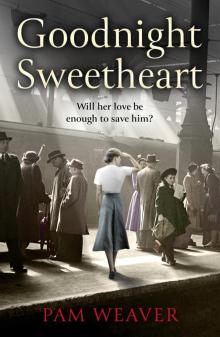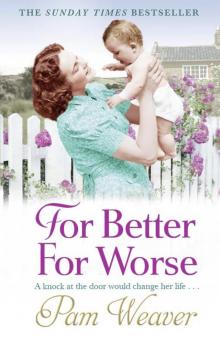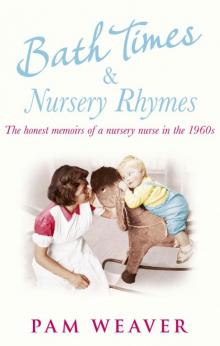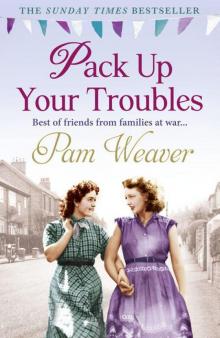- Home
- Pam Weaver
There’s Always Tomorrow Page 8
There’s Always Tomorrow Read online
Page 8
‘A week or so?’ cried Dottie.
‘We keep visits to a minimum,’ the sister continued. ‘Normally we would allow his mother to see him for twenty minutes or thereabouts, but as you say, she’s pregnant.’
‘I could take her place,’ Dottie said, ‘at least until his mum is in no danger.’
‘At this highly infectious stage,’ the sister went on, ‘it’s best for the patients to remain calm. Family visits are very unsettling for young children. They cry for hours afterwards.’
‘Can we at least see him now?’ Dottie asked. ‘I want to put his mother’s mind at rest.’
‘Is he going to die?’ Jack choked.
‘It’s always possible,’ the sister said, ‘but personally I think he’ll be more stable in a day or two.’
‘Please God,’ Jack murmured.
‘I tell you what,’ said the sister, her tone softening, ‘pop in now, just for a minute to see him settled and you,’ indicating Dottie, ‘can visit him on Monday.’
Dottie couldn’t hide her gratitude. ‘Thank you, oh thank you.’
‘But when you do come, it can only be for twenty minutes,’ the nurse cautioned. ‘No more.’
‘I understand,’ said Dottie gratefully.
They followed her back onto the ward and tiptoed to Gary’s cot. His eyes were closed and although his face wore a frown, he certainly looked more peaceful than when they’d brought him in. He was still very flushed and a young nurse was sponging his face with water.
The sister picked up the temperature chart at the foot of the bed. ‘His temperature is one hundred and four degrees fahrenheit,’ she said.
Dottie touched Gary’s fingers. ‘Night, night, darling,’ she whispered. ‘See you in the morning.’
Jack leaned over the cot and kissed his son’s forehead. ‘Night, son,’ he wept.
Gary started to cry again.
‘Come along now,’ said the sister briskly. ‘It’s best not to upset the little lad again.’
Nine
It was quarter to ten when Dottie finally got home. As Jack dropped her off at the gate, she saw Ann Pearce’s curtain twitch. Nosy old cow, she thought irritably. She’d probably think she could get even more money out of her now. That last time … it was blackmail, wasn’t it?
As Dottie walked indoors, Reg scowled. For one sickening second, Dottie thought Ann might have been round and told him about Dr Fitzgerald.
‘How long does it bloody take to go to the doctor’s house and ask him for a visit?’ he demanded. ‘I’ve been waiting for hours for my tea.’
‘They took little Gary to hospital,’ she said.
Reg’s expression changed. ‘Hospital?’
Dottie slipped off her bolero and reached for her wrap-over apron. ‘I’m afraid Gary has been admitted.’
Reg lowered himself into a chair. ‘Admitted …’
‘It’s a bit late for cooking,’ Dottie said matter-of-factly. She was angry that he’d sat there all that time, helplessly waiting for her to come home. Couldn’t he have got his own tea for once? ‘Shall I do you a couple of fried eggs?’
He nodded and she set about gathering the frying pan, the eggs from the bucket of cold water on the scullery floor and the dripping from the meat safe.
‘What’s wrong with him?’
Heartened that Reg was so concerned, she forgave him immediately.
‘He has polio,’ she said, cracking an egg over the melted dripping in the pan. ‘But they seemed to think he’ll be a bit better in a day or two.’ She filled the kettle with water and put it on the gas.
‘Peaches staying with him, is she?’
‘No,’ said Dottie. ‘They wouldn’t allow it. It’s too dangerous, what with her being pregnant and all. That’s why I went.’
His eyes flashed. ‘You?’
She cut a slice of bread and put it into the hot fat. ‘And I promised Peaches I would visit him until she’s allowed to go.’
‘You’re not to go.’
‘Although how I’m going to fit it all in I don’t know,’ she said turning the bread over.
‘I said,’ his tone was harsh, ‘you’re not to go.’
She gave him a puzzled look. ‘But I promised.’
‘I don’t bloody care! You’re not going.’
She put the eggs and fried bread onto his plate and put it in front of him. Then she filled the teapot and sat at the table with him. She wanted to throw the supper at him. She’d have given anything to scream at him, ‘I’ll make my own decisions and I don’t need you to tell me what to do.’ But she knew she had to tackle this calmly. He was getting wound up and if she upset him too much, he’d be horrible for days.
‘Look, Reg,’ she said quietly. ‘I know you’re worried about me, but really, I don’t think I’ll come to any harm and Peaches is upset that Gary won’t have anyone he knows.’
He glared at her and stabbed the air with his fork. ‘I don’t care about bloody Peaches. I’m telling you now, you’re not going and there’s an end to it.’ A splatter of egg yolk ran down his chin.
‘But she’s my friend.’
He carried on eating. She poured his tea and one for herself. She had to make him understand just how important this was. She didn’t have many friends around here and Peaches was one of the best. She’d been there for her when Auntie Bessie died. She and Mary had virtually done the whole of her wake: Dottie had been in such a state, and Reg wasn’t much help, so she’d been glad to leave it to them. Their friendship went way, way back. Peaches, Mary and Sylvie had kept her going for many a long and lonely month while she’d waited for news of Reg during the war. Other women had been allowed to write to their husbands but Reg had been on a top-secret mission so she had to wait it out with no word from him at all. Peaches, Mary and Sylvie had been there for her which was why it was so important not to let Peaches down in this, her hour of need.
‘Reg,’ she tried again, ‘don’t worry. I’ll be perfectly safe.’
He slammed his knife and fork onto the plate, making her jump. Then he leaned back and, reaching into his pocket, drew out a piece of paper.
‘No, it’s not bloody safe,’ he cried. ‘And there’s the reason why you can’t go.’
He threw the paper onto the table in front of her. Dottie’s heartbeat quickened. The letter from Australia! She’d forgotten all about it. She’d had what Aunt Bessie would have called a presentiment that it wasn’t just any old letter the moment she first set eyes on it. Now it rested on the table between them, small and rectangular, and yet it seemed as big as a house.
She stared at the sloping handwriting, the stamp and the strange postmark, and her blood ran cold. This must be serious, but what on earth did it say? She shivered and looked up at her husband.
‘Well, go on,’ he said with a note of triumph in his voice. ‘Read it. I know you’re dying to.’
Her hand was trembling as she picked it up. So flimsy and yet heavy with destiny. It was going to change her life, she knew it … she just knew it.
She took it out and read it slowly. I never told you but in ’43 I had a child. Her name is Patricia. She’s eight now. Her eyes filled with tears and she swallowed hard. 1943? He had been with some other woman almost as soon as they had been married? He’d been sent abroad just four weeks after their wedding and straight after that, the very next year, he’d been unfaithful?
Please come to fetch her, she read on, I hope that deep down, you can find it in your heart to forgive me … She laid the letter on the table and looked up at him. He was smiling.
‘See?’ he said triumphantly. ‘You think I can’t bloody do it, but I can see? I’ve got a kid of my own. She gave me a kid. She knew how to turn a man on. She knew what to do. Not like you, you bloody cold fish.’
His words cut her into a thousand pieces but all she could think of was that he had had a child with another woman. He had a child … and she didn’t. Why couldn’t he make love with her? Other people thought she was attractive b
ut he was always calling her a cold fish, even though she really tried. She did everything he wanted her to, even things she didn’t like.
‘For God’s sake, stop that snivelling,’ he said sharply and Dottie suddenly realised that she was crying. She reached into her apron pocket and pulled out her hanky. Then she blew her nose quietly and dabbed her eyes. She shouldn’t have done that. It must have been the shock of seeing Gary.
‘I want to get her over here,’ he was saying. ‘I want my little girl here, living with us.’
‘Living with us?’ she said faintly.
‘Why not?’ he challenged. ‘She’s mine. Why shouldn’t I have her here?’
Dottie stared at him, her brain refusing to function. This was all too much for one day. Foolishly she’d always thought he’d been as faithful as she’d been. It never crossed her mind that he’d even had the opportunity. No, she hadn’t thought about it. She’d just presumed … but how wrong had she been? He had a child, a daughter. And now he wanted her to come over here?
Her stomach churned. All at once she felt sick and jumped up and ran to heave over the slop bucket in the scullery.
‘That’s right,’ he bellowed after her. ‘Always got to be the centre of attention. Get yourself noticed. Let’s have the drama queen.’
She steadied herself and wiped her mouth on her hanky, then she walked back into the kitchen.
He was sitting with one hand on his head and the other holding the photograph. ‘I want her here, Dot,’ he said. ‘I want my little girl.’
She couldn’t speak. She wanted to be happy for him, but his joy was her misery. He didn’t seem to care about how she was feeling. She couldn’t think straight. Her eye was drawn to the woman in the photograph.
‘Don’t you see, you daft bat?’ he said looking up at her. ‘This is your chance too. You’ve always wanted to be a mother. Well, now’s your chance. A little girl. Patsy. Nice name, Patsy. We’ll be a family.’
‘But I want a family of my own!’ she blurted out.
Reg leapt to his feet and struck her across the mouth. Dottie tasted blood as her lip split under the force of his blow. ‘Maybe this is the closest you’re going to get,’ he snarled. ‘I can do it with a real woman, but I can’t do it with you. I can’t do it in this house. Doesn’t that tell you something? Eh?’
Dottie leaned against the dresser, utterly crushed.
‘We’re going to get my baby over here,’ Reg said sitting back down again with the photograph, ‘and we’re going to be a real family. Me, Patsy and you.’
Dottie opened her mouth but no sound came out.
He turned and glared at her again. ‘That’s why I don’t want you going near that Gary see? I can’t have my Patsy getting polio.’
Ten
‘You’re very quiet today, Dottie.’
Janet Cooper, Dottie’s Monday and Tuesday employer, gave her a concerned look as she filled the kettle for their afternoon break.
Dottie had been miles away. She couldn’t get the events of the previous weekend out of her mind. Worried about little Gary and upset by Reg’s revelations and rantings, she had gone about her work as quickly and as quietly as she could. She hadn’t stopped for her mid-morning break, neither had she stopped to eat the sandwich Janet had prepared for her as she closed the shop for the lunch hour. Dottie didn’t want to be drawn into a conversation in case she said something she might later regret. She was glad today was Monday and not Tuesday. Dottie helped in the shop on Tuesdays and it was easy to be drawn into long conversations between customers. Janet loved a little gossip. Starved of excitement in her own life, she thrived on the misfortunes of others and had a clever way of weeding juicy bits of gossip out of someone, no matter how reluctant the person might be to part with them. Had it been Tuesday, Dottie would have told her about their day in Littlehampton and little Gary’s illness and, before the day was over, it would have been all over the village. Fine if Peaches told friends and neighbours, but Dottie didn’t want people to hear it from her lips first.
Janet cut across her thoughts again. ‘I see Ellen Riley’s daughter is on the bottle again.’
Dottie gave her a quizzical look.
‘There was a definite bulge in her coat pocket when she came into the shop this morning,’ said Janet, clearly enjoying her tasty morsel of gossip. ‘Want a biscuit with your tea?’
Dottie shook her head and wished Janet a million miles away.
‘It’s the kids I feel sorry for,’ Janet went on. ‘If you can’t be a responsible parent, you shouldn’t have children, that’s what I say.’
Dottie switched off. Monday was the day she cleaned the Cooper house from top to bottom. Upstairs, she changed the beds, hoovered the rooms and dusted. Then she’d come down and spend the rest of the morning putting the dirty sheets in the washing machine. You had to stand over it when everything went through the wringer, but it was a great help and if the weather was kind she would end the day by ironing the same sheets she had changed in the morning.
With the washing on the line, the afternoon was spent cleaning and dusting downstairs. It was one of her heaviest days and yet with the weight of everything on her mind, she hardly noticed the time passing.
She’d been up early that morning. Reg was still in bed when she’d left for the Coopers. After another outburst about not seeing Gary the night before, she had poured him his usual cup of tea in the morning, but instead of making sure he was awake, she’d crept upstairs, being careful not to disturb him. She’d left the tea on the bedside table. He’d groaned and rolled over when she put the cup down and she’d panicked, but she stood very still and almost immediately he’d begun to snore again. Dottie hurried downstairs and out of the house. She didn’t want … couldn’t face talking to him again. Why did she always take him a cup of tea anyway? It had started when he first came home. He was ill then. He was fine now. Well, he could get his own tea from now on, she told herself defiantly.
All day long she’d gone over and over the things he’d said and she was surprised to realise that, for the first time in her whole life, she resented the idea of looking after someone else’s child. If Patsy was already eight, there was no way she could pretend the child was hers. What was she going to say to the people in the village? She hated the thought of everybody talking behind her back.
‘Of course, you know that poor Dot Cox can’t have any children.’
Dottie bristled at the thought of being an object of pity.
‘Can’t blame a man for wanting his own child, can you?’ they’d say.
And what about the child? When she had been conceived, she and Reg were already married. Everyone would know he’d been with another woman. War or no war, what sort of a man goes with another woman within a year of his marriage? What did that say about her? And what about the child herself? Poor little thing. She didn’t ask to be born, did she?
‘Dottie …’ Janet said.
Dottie frowned. She refused to feel sorry for the child. Why should she? But while she was ironing, she found herself wondering what she looked like. Reg had black hair but only out of a bottle to hide the grey. The woman in the picture was fair. She imagined Patsy all peaches and cream, a little Shirley Temple with pretty blonde curls, who smelled of talcum powder and Gibbs toothpaste. Dottie folded and shook a sheet viciously and banged the iron down on it. She had to stop doing this. She didn’t want her. She didn’t want Reg’s kid. She wanted her own child. And another thing, why should he rant and rave on like that, expecting her to like the idea? She’d be nothing more than an unpaid servant. She was his wife, for goodness’ sake. Why should she open her home to his … his bastard!
‘Dottie!’ Janet Cooper’s voice brought her abruptly back to the present. ‘You’ve ironed that sheet to death. Sugar in your tea?’
‘Er, no. I’m sorry,’ Dottie said. ‘I was miles away.’
‘So I see,’ smiled Janet. ‘Nothing serious, I hope?’
‘I was wondering …’ Dottie bega
n hesitantly, ‘would it be possible for me to go early today?’
Janet Cooper looked at the clock. Normally her cleaner left at four. It was now ten to three. She frowned. Dottie didn’t usually ask favours but she’d have to be careful. Give these people an inch … the last thing she wanted was Dottie taking liberties.
‘I came in at eight instead of nine,’ Dottie pointed out, ‘and I haven’t taken any breaks.’
Janet hesitated. ‘Is it Reg?’ she asked.
Dottie chewed her bottom lip. She didn’t like telling lies but she could see by her face that Janet Cooper needed a good reason to let her go. ‘Yes.’
‘Oh my dear, why didn’t you say so? Of course you must go. We can’t do too much for those of our brave boys who came back. Yes, put the rest of that ironing away and off you go.’
Fifteen minutes later, Dottie, feeling somewhat ashamed and guilty, was hurrying to the next village. Durrington was easily a mile and a half away and she decided not to catch the bus that stopped outside the shops. She didn’t want anyone from the village telling Reg they’d seen her catching the bus. It was a bit of a rush, but she was fit and knew she could do it.
‘How was the trip to Littlehampton, Reg?’
Marney handed him a chipped enamel mug of tea. Reg was acting as ticket collector today, although there were few passengers on a weekday afternoon. He put the steaming mug to his lips and slurped in a mouthful of tea. ‘Not bad.’
‘Kids enjoy themselves?’
‘Reckon so.’
‘The wife wanted me to take her over for the torchlight procession and the fireworks,’ Marney went on, ‘but our Jean and her hubby came by. We all got chatting and then it was too late. Was it good?’
‘We were back before 8.30,’ said Reg. ‘Mary’s boy wasn’t looking too clever, so Peaches and Jack took him to the doc’s.’
‘Shame,’ said Marney. ‘All right now, is he?’
‘Suppose so,’ Reg shrugged.
‘A bit of a fuss about nothing, I expect,’ Marney observed. ‘It usually is where kids are concerned.’

 Goodnight Sweetheart
Goodnight Sweetheart At Home by the Sea
At Home by the Sea For Better For Worse
For Better For Worse Bath Times and Nursery Rhymes
Bath Times and Nursery Rhymes Love Walked Right In
Love Walked Right In Pack Up Your Troubles
Pack Up Your Troubles Always in my Heart
Always in my Heart Sing Them Home
Sing Them Home Amy's Seaside Secret
Amy's Seaside Secret There’s Always Tomorrow
There’s Always Tomorrow Better Days Will Come
Better Days Will Come Family Drama 4 E-Book Bundle
Family Drama 4 E-Book Bundle